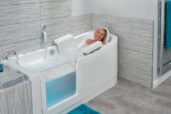As summer approaches, most of us welcome the spells of warmer weather. However, for elderly people, and those who are living with a disability, hot weather can create extra risks. Extreme heatwaves over a number of days leads to excess deaths among vulnerable groups. If you care for someone in this category, here are some useful points to bear in mind.
What are the risks posed by heat?
One of the most common problems caused by heat is dehydration. This is because the body sweats in an attempt to regulate its core temperature. Once sweating is impaired by excessive fluid loss, the body may overheat, triggering potentially fatal cardiovascular conditions in vulnerable groups.
Dehydration also affects the electrolyte balance, which can be made more severe by some medications, the GOV.UK website explains. Those who suffer from asthma and other chronic respiratory conditions may also experience a worsening of symptoms, due to the high ozone levels.
Heat illness to look out for
Heatstroke occurs when the body’s core temperature reaches 40°c or more, and it loses the ability to thermoregulate. It’s a serious medical condition, and the major symptoms are confusion, disorientation, convulsions, unconsciousness, and hot skin that has lost the ability to sweat.
If you spot someone with heatstroke, first attempt to move them somewhere cool, and ask them to lie down and elevate their feet. Cool them down with icepacks, sprays, or fans, and get them to drink chilled water. If they have not cooled down within 30 minutes, or they are short of breath, confused, not sweating, fitting or unconscious, call 999 straight away.
Heat may also cause oedema, which is a swelling that occurs in the ankles, due to fluid retention. If this is severe, or accompanied by a very high temperature, a tight chest, or shortness of breath, medical assistance should be sought. Other common heat-related conditions are cramps, and heat rashes.
What actions can help in a heatwave?
During the hottest part of the day, from 11am to 3pm, encourage vulnerable people to remain indoors and refrain from strenuous physical activity. If the outside temperature is warmer than the indoor temperature, keep the curtains and windows closed until the day starts to cool off.
If one room or area of the home is cooler, for example, a north-facing room, encourage the person to sit in there. If they are of limited mobility, help them remain cool with fans, chilled drinks, and damp sponges, especially on the back of the neck. However, avoid diuretics such as tea, coffee, cola, and alcohol.
If the person requires assistance with personal care, help them to take a cool bath or shower, as this will help the body to regulate its core temperature. Encourage them to wear loose fitting, light clothing in natural fibres, if they are not in the habit of doing so, as this will help them to sweat freely.
If you are interested in finding out more information about mobility bathrooms, call us on 01491 411041 or visit our website.
4 June,2022







